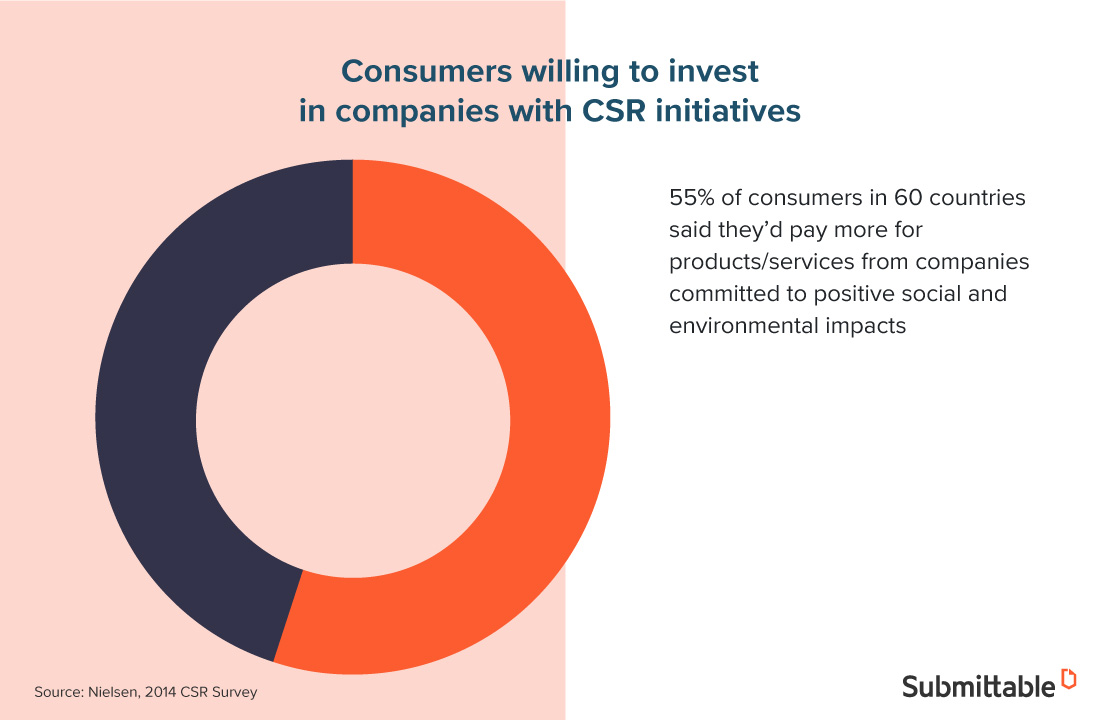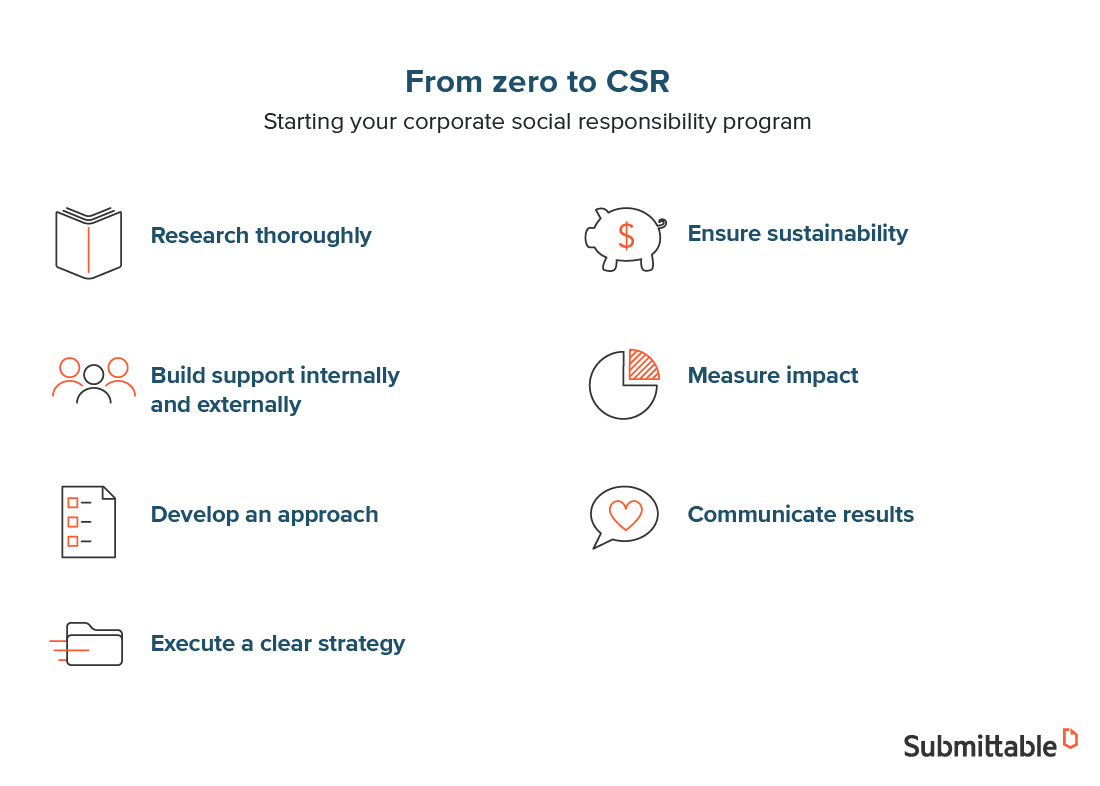A corporate social responsibility (CSR) program can have a huge impact on the lives of community members.
Take the example of the recovery efforts after the Gorkha earthquake in Nepal in 2015.
After the earthquake, the country’s largest mobile service provider (Ncell) shared its mobile data with a Swedish nonprofit involved in local humanitarian aid at the time. This sharing of data helped local organizations and the government map population movements and better target aid to affected communities, enhancing the impact of the recovery aid being delivered.
To be clear, most CSR initiatives aren’t happening in such dire circumstances.
These days, CSR is primarily an umbrella concept, encompassing everything from climate resilience initiatives and brand activism to important conversations about diversity, inclusion in the workplace, and ethical supply chains.

More C-suite executives are examining what effective corporate citizenship looks (and acts) like. Beyond just creating value for their brands, companies are considering how they account for the environmental and social impacts of their work—and CSR is a major part of the equation.
When it comes to CSR, the big question for companies is no longer why or when but how.
Organizations across industries can maximize their impact by building a strong CSR operation.
The many benefits of CSR and how to get started

Gone are the days of CSR initiatives run by organizations to simply “look good.”
Modern consumers are savvier than ever. They want to do business with companies that do good. And they’ve got the tools to find and engage with businesses that are taking CSR seriously, from supply chain sourcing practices to internal pay equity standards.
The simple reality here is that CSR is good for both the community and your company’s bottom line.
Organizations looking to stay competitive are incorporating CSR into their core brand. CSR has risen from a low-level marketing initiative to a standing C-suite agenda item.
When it’s well-executed, CSR helps your brand stand out to consumers as a great investment, especially as a repeat customer. The data backs up this notion, with Nielsen reporting that more than half of consumers would willingly pay more just to buy from companies seen as contributing to positive social impacts.
Whether its improved brand recognition or a bigger bottom line, the many benefits of CSR are becoming more clear to companies looking to make an impact in their local communities or even globally.
As you prepare to launch a company CSR campaign, consider a few key steps:
- Starting a great CSR program requires setting clear goals for what you hope to achieve.
- Take time to poll your customers and employees on what social impact work is important to them. Assess your internal capacity for implementing CSR initiatives that resonate with your team, have significant buy-in and can be feasibly well-executed.
- Conduct a needs assessment in partnership with relevant organizations engaged in work adjacent to the kinds of CSR programs you’re looking to run. This will give you an important baseline understanding of the problems you’re looking to tackle while helping you to maximize impact.
- Before beginning the actual work of your CSR program, set up systems for evaluating your impact. Make sure to set clear guidelines for initiative success and communication with relevant stakeholders about your progress.
Taking these first key steps will set your CSR initiative up to succeed in the long run. You’ll also want to consider how you can build your overall CSR strategy from scratch.
How can Submittable bring your CSR management to the next level?
Find out how much your organization could save.
How to start a CSR program from scratch

Getting from an initial idea to actual impact isn’t simple.
From learning about community needs and building support for a project to executing your strategy and measuring its impact, running a CSR campaign is complex.
Let’s break down the steps you should take for building your CSR initiative from start to finish.
1. Research thoroughly
It’s important to do your homework.
Before you engage in community-based work, make sure that you’ve gotten a solid lay of the land to better understand your capacity for executing a CSR campaign. This should be accompanied by an assessment of what’s needed in the community.
Every CSR campaign should be grounded in strong knowledge of and connection to the community you’re looking to serve.
Internally, determine the purpose of your CSR program as it relates to the projected impact you wish to have on society.
What are your values as a company?
Which unique skills are you bringing to the table?
Once you’ve clarified what makes sense for you to offer, build a strategy around the needs assessment you’ve conducted within the community you’re looking to serve.
2. Build support internally and externally
The next big step is gathering support for your project.
Poll your team. Ask them to help you identify potential projects in your community.
Next, search your company for talent aligned with your vision for corporate social responsibility. These team members will recognize the issues that matter to your customers—they’ll also be ready to put in the work.
Your goal is to run a CSR program that will make both your customers and your team proud.
Armed with that internal support, you can begin building relationships with external stakeholders such as community leaders and organizations to partner with in your CSR campaign.
They’ll likely know the lay of the land better than your team and frankly, you’ll need their support and collaboration to achieve those lofty CSR goals. Also, it’s the practical (and kind) thing to do since you’ll be working alongside them in their communities.
These external stakeholders will inform how your CSR campaign is shaped, they’ll help you execute it if you enlist them, and they can even support how you measure the impact.
That’s a trifecta of CSR support you shouldn’t miss out on. Build those local relationships.
3. Develop an approach
The best-laid plans, even if they go awry, are better than no plan.
Again, your ultimate CSR program should flow from your company values, link to the causes your staff and customers care about, while also addressing pressing issues in your community.
While it’s easy to bite off more than you can chew, start small and focus on having a deep and long-lasting impact using the resources you’ve got lined up. One way to do this is to focus in on the challenges cited by community members in your initial research. Figure out where your company is best positioned to have an impact and commit your resources there.
Once you’ve narrowed your focus, select the organizations and leaders that you’ll support and get very specific about how your CSR program will assist them over a clear timeline. This is where you dig into the discrete details. As much as you can, link your plan to efforts already going on in the community to maximize your impact.
At this stage, you’ll want to look ahead to future steps and really think through execution, how you’ll sustain the program, how you’ll measure its impact and how you’ll communicate those results.
Map it out in as much detail as you can at this point, recognizing that as facts on the ground will shift, so will your approach.
4. Execute a clear strategy
Execution is where all of your preparation and diligence pays off.
Whether you’re tackling health disparities in local neighborhoods or running a literacy campaign partnered with nearby schools, this is where you get to see your big plan in action.
Make sure you build in time for reflection as you execute your CSR program. It can be easy to get caught up in the grind of the work itself. Whether it’s a monthly all-team meeting or quarterly data check-ins, create some space for analysis within your execution strategy.
When it comes to the data, ensure that you’re collecting it throughout the project, not just at the end. Set up clear data collection checkpoints and hold your team accountable for gathering the relevant stats you’ll need to measure your impact.
Listen as you go. Check in with the team regularly and with community members, recipients of the CSR project most importantly, so see how the CSR work is landing for them.
Lastly, take time to celebrate progress. Give your team shout outs for small victories along the way. Keep the whole company updated on the results as they come in and invite them out to see the work, even if they’re not directly involved in the project.
5. Ensure sustainability
Casual, one-off community service projects are on their way out.
More organizations are focused on having a long-term, sustained impact in their communities through CSR work. But given all of the other priorities companies face, this can be challenging.
Moving CSR into your C-suite is one great way to keep it front and center. Keep it data-driven and link the results of your CSR program to your broader company metrics.
In other words, make it a priority, just as you would metrics like profitability and operational overhead.
Relatedly, budget for CSR just as you would other ongoing company expenses. Make it a budget line that’s just as central to your business model as wireless connectivity or travel funding for your sales team.
At the same time, constantly evaluate your CSR model to better understand how you can achieve greater impact at potentially lower costs to improve efficiency.
6. Measure impact
Measurement isn’t a destination, it’s a journey.
Having interim points of analysis throughout the campaign will help you execute better during your CSR work while also informing your overall strategic approach.
External stakeholders will help your organization better understand how CSR efforts are landing in the communities you’re serving. Community members can and should be the ultimate arbiters of whether a CSR program “worked.”
Inside your company, be sure to regularly check in with your team working on the project and your wider employee pool to determine how CSR work is impacting your company culture and morale.
7. Communicate results
Even in the realm of CSR, ROI still matters.
That’s how you sell CSR in the C-suite and to investors.
The community members being served are also invested in your CSR dollars furthering impact. They too desire efficient CSR programs that invest in their communities in judicious yet powerful ways.
More broadly, sharing the results of your CSR program with other companies and the broader public builds brand equity while enriching the overall CSR community with the knowledge and insights needed to improve practice. This can look a nice, glossy report or even a brief, shareable video that documents the impact of the program.
In other words, communicating your impact helps others make an even bigger impact. Don’t keep your cards too close to your vest here. If you’ve made mistakes along the way (which you will), isn’t it better to share them humbly and allow others to learn from them?
Lastly, sharing the results from your CSR programs will help your team shift the ways they execute future initiatives based on those learnings. Growing from one CSR project to another is a key part of building a longer-term, evidence-based approach to maximizing your impact in the community.
It’s the responsibility part of CSR.
Leveraging the right tools for your CSR initiatives
The work on the ground is hard enough.
Managing CSR programs is a complex venture that can eat up a lot of your team’s time and resources. For initiatives like CSR that have a big impact on your brand’s identity, its reputation in the community, and the company’s bottom line, it’s important to be thoughtful about best practices and use the best possible tools to ensure your initiative is run efficiently.
Submittable’s CSR software allows your company to connect to important causes while reducing the time it takes to manage your CSR program. If you’re looking to grow your impact while simplifying the processes that drive your CSR initiatives, look no further.
